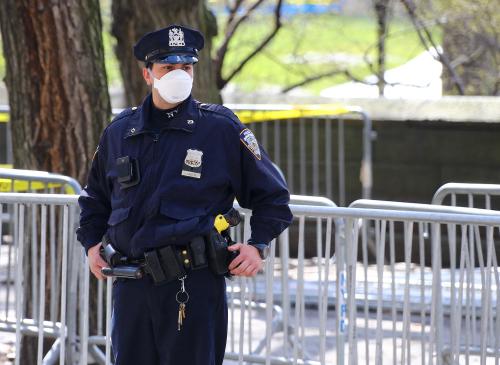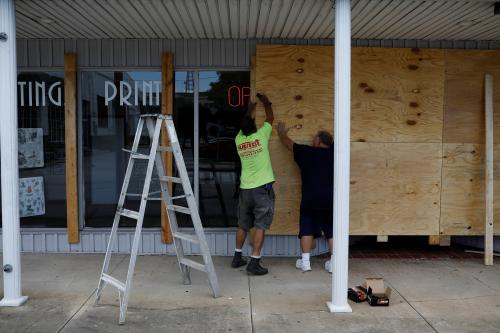“Paris, San Bernardino, New York, Boston, Mumbai, Kabul, Baghdad, Aleppo. Cities tend to dominate the headlines, particularly when it comes to the issue of security,” Brookings Executive Vice President Martin Indyk said to open the inaugural panel of the new Securing Global Cities (SGC) project at Brookings. “And it is cities,” he continued, “that have become more and more the drivers of … economic growth [and] personal security in the 21st century.” Indyk moderated a panel of distinguished experts who identified complex threats and problems that cities face and examined some of the tools that governments can use to address them.
Equip cities to deal with future issues
Former Army Chief of Staff General Ray Odierno (U.S. Army, Ret.), now a senior advisor at JPMorgan Chase and co-chair of the SGC project with Brookings Senior Fellow Michael O’Hanlon, shared some of the lessons he has learned on how to equip cities to deal with future development and security issues. His key points focused on the rapidly increasing interconnectedness of the world through information, the rise of megacities, and the “interrelationship” among economics, governance, and security. Watch:
Gen. Odierno also responded to an audience member’s question about how cities that strive for openness, migration, and multiculturalism can balance those aspirations with reassuring the people who already live there that migration is not a security risk. Noting that the world will continue to see huge refugee flows in coming years, he said that
What you can’t do is allow them to come into your country and then segregate them. Segregate them by where they live, segregate them by what rights they have, segregate them by what jobs they can hold, segregate them about what they can do.
He added a personal note, telling the audience that his grandfather was an Italian immigrant and that he, General Odierno, became head of the U.S. Army. “So that’s how you solve this problem,” the general said, “you have to allow them to be totally integrated, not segregated.
Lessons from Mumbai terrorist attacks
Brookings Distinguished Fellow Shivshankar Menon, former national security advisor to the Indian prime minister and also India’s foreign secretary, spoke about what India learned from the 2008 Mumbai terrorist attack. He emphasized that terrorists “want to dominate the news cycle” and “provoke a disproportionate response.” So, he said, “don’t give it to them.” Watch:
Menon also spoke to the issue of preemption, which requires intelligence, but which also means “you have to start walking this very fine line between peoples’ freedoms and preemption.” He noted that India’s first law that accepted the idea of preemption came about after the Mumbai attacks. Finally, Menon explained the problem that sophisticated terrorist attacks “require support or connivance from state entities.” How, he asked, “do you convince states that this is counterproductive?”
Additionally, Menon said that it is not realistic to eliminate this kind of security problem or to prevent all casualties—though various tools of intelligence sharing and preemption could reduce the odds of a successful attack.
Bifurcation of cities and the problem of slums
Vanda Felbab-Brown, a senior fellow in the Center for 21st Century Security and Intelligence at Brookings, observed that “one of the defining characteristics of what’s been happening in cites over the past several decades is a great sense of bifurcation.” She explained bifurcation within cities (a relatively secure core versus vast slums); bifurcation between cities and the countryside; and bifurcation between cities within a country. Watch:
In her remarks, Felbab-Brown also concentrated on the problem of non-state actors providing governance in slums, and how this “intersects in complex ways with counterterrorism.” One problem, she noted, is that counterterrorism policies often “go quite fundamentally against the basic principles of community policing.” She also emphasized the intertwined problem of “who has trust and who has authority in the community?” Felbab-Brown explained that increased security will “likely bring you some sort of effect much faster than socioeconomic approaches,” but that does not address the trust and authority issue.
Felbab-Brown made a further point about what she described as “failed cities,” where “in major urban areas there are many parts of the city—often the largest parts in terms of the number of people who live there but also the territory—that have been left behind decades ago … by the government [and] by the more privileged members of society.” She noted that these areas don’t have basic services, job creation, and are growing. “Most of the migration from the rural areas,” she added, “is not taking place into the wealthiest centers of the cites … it’s taking place into slums.” And dealing with these problems requires enormous resources and a “decades-long willingness to increase taxation on the rich and middle-class to provide for the urban poor.” However, “often then the willingness evaporates as soon as violent criminality goes down and stops encroaching on the city center.”
Lessons in crime reduction from Colombia
The next speaker was Juan Carlos Pinzon, ambassador of Colombia to the United States and previously his nation’s defense minister. He described the efforts his government has made to reduce terrorism and organized crime, to address poverty, and to create jobs in his country, with particular emphasis on the cities of Cali, Medellin, and Buenaventura. Amb. Pinzon explained that one solution was to increase policing in all three cities, including a military police intervention in the Pacific port city of Buenaventura. “Increasing that kind of capability,” he said, “was necessary to show presence, to provide security, and to offer to the citizens the sense of presence that is sometimes necessary to create security.” But he added that this was not just a military or a security problem; instead, “at the end this is a justice problem.” The addition of more attorneys and prosecutors allowed an improvement in the legal process to address crime. Further strategies included helping mayors with the resources for investment, education, jobs, and health care.
Amb. Pinzon summed up the lessons learned in Colombia by noting that “security requires an integrated effort,” not just a military solution that goes after the “bad guys.” And part of this integrated solution is to offer people alternatives on education, job creation, and anything else “that really gives stability long term.” Watch:
Amb. Pinzon also contemplated the question, “what is ‘victory’?” in terms of security and cities. In Colombia’s case, he explained, “we were able to reduce the size of the problem to 30 percent of what it was 15 years ago … the size of the FARC, ELN [two guerilla groups] and crime in general is 30 percent of what it was.” But this level of success didn’t come about purely through military means, Amb. Pinzon said. Instead, political tools were necessary: it was “more a mix of security and political discussions,” he said.
Three principles: resources, intelligence-sharing, organizational linkage
Michael O’Hanlon, senior fellow and co-director of the Center for 21st Century Security and Intelligence, outlined three principles that he says “have been important in our response” in the United States. These are: adequate resources—specifically human resources, not robots; “marrying up” national-level intelligence with “what the cop is learning on the beat and on the street”; and sorting out the linkages, relationships, and mechanisms whereby organizations and people across all levels of government can work together. Watch:
“One thing I’ve learned from my colleagues in metropolitan studies over the years,” O’Hanlon added, “is how cities in general struggle to unify themselves at the right level of planning because they are usually multijurisdictional. … [In the Washington, DC region] we have planning going on at the city, regional, state, and national levels and getting all of these different entities to work together is a hard problem that is going to vary from case to case.”
The panelists also discusses the importance of infrastructure (including water delivery, policing, economic development); the use of technology for surveillance and its intersection with civil liberties; the migration of new people into cities (mostly into slums); corruption; and the critical importance of leadership.
Reflecting on his experience leading the counterinsurgency campaign in Iraq and commanding overall forces there, General Odierno offered one additional lesson: “There are limits to military power,” he said,
And so no matter how good you think you are or how much capability you have you can’t accomplish everything with military power alone. It has got to be integrated with good governance; it has got to be integrated with the creation of jobs and economic development. And if it’s not, it is going to be really difficult.
Watch the full video and get more information about this event here.
Securing Global Cities is part of the Global Cities Initiative, a joint project of the Brookings Institution and JPMorgan Chase. JPMorgan Chase is a donor to the Brookings Institution. Brookings recognizes the value it provides is in its absolute commitment to quality, independence, and impact. Activities supported by its donors reflect this commitment.


Commentary
WATCH: Experts discuss securing global cities
February 11, 2016